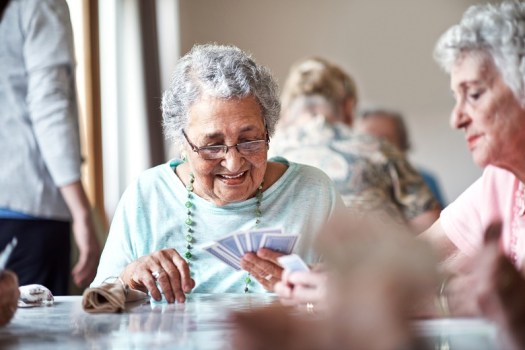
Two Sydney councils have helped launched an initiative that brings together ageing home owners and younger community members with the aim of reducing social isolation among seniors and delaying the move into residential care.
The HomeShare arrangement, delivered by home and community care provider Holdsworth Community and funded by council, is designed to allow older people to remain in their own homes while offering an affordable housing option to a younger person.
The initiative affords the owner security, social interaction, financial support and/or practical help, while the sharer has access to safe and affordable housing. It also means companionship for both.
Home share schemes have had positive social impacts in the UK, US, Europe and some other states in Australia. However the concept has failed to take off locally, often due to mismanagement or a lack of planning.
However The City of Sydney and Woollahra councils are determined to make the idea work.
Establishing home share matches

Catering for localities where housing costs are well above the Australian average and almost a third of people live alone, the two councils are advertising for people to come forward so matches can be established.
Holdsworth Community will facilitate the matching process and ensure the home is neat, tidy and appropriate for sharing. It will also conduct police and safety checks, help build an agreement between the parties and provide ongoing support to both the owner and sharer.
The program offers huge potential benefits for the local community, Woollahra Mayor Peter Cavanagh said at the program’s February 7 launch.
Ruth Kestermann, CEO of Holdsworth Community, says while the program is still in its pilot stage, there has been a lot of interest, especially from sharers.
“We’re hearing from young people and students but also middle-aged people going through a transition in their lives, particularly women,” she says. “I think a lot of people see it as a great affordable housing option and they just want to connect with someone else, so that’s really great.”
For the owners, it’s often a bigger decision, she says. “A lot of them have perhaps been living on their own for a long time and we don’t expect them to make a decision as quickly as the younger people might.”
A good match is essential for the program to work, and may have been responsible for failures in the past. Holdsworth will spend time making sure that personalities, interests and requirements of the sharer and owner align.
In South Australia, aged care provider Enabling Confidence at Home (ECH) has been designing its own home share scheme and has been conducting focus groups and conducting one-on-one interviews with interested owners and sharers. But ECH chief executive David Panter says there is a limitation, as fewer older people these days own their own home. For this reason, ECH has discovered an even greater interest among older people for co-housing.
Co-housing is alternative home share arrangement where people of a similar age with similar needs rent a multi-roomed house. They can enjoy secure accommodation, and the support and company of each other, while a home carer can respond to all their needs in the same place.
Mr Panter believes that as more people move away from home ownership towards renting, demand for both shared and co-housing options will only increase.
In Sydney, Ms Kestermann hopes home sharing will take off as both older and younger people see the benefits.
“We hope if we can get a financially sustainable model up and running and demonstrate its potential, then it can really offer great options for people across Sydney and in other parts of Australia as well.”
Comment below to have your say on this story.
If you have a news story or tip-off, get in touch at editorial@governmentnews.com.au.
Sign up to the Government News newsletter.



It is a win-win strategy and has been adopted in several other countries as well- it should be the trend and government need to push further.
Home share between older people and younger people is an insane idea! It is only going to lead to a significant increase in cases of financial and psychological elder abuse. People of a similar senior age sharing a communal home is fine, as they will help each other out. But there is a generation out there, full of young, malignant narcissists who are selfish, greedy individuals. And I can assure you, they will use the home sharing set-up as a means to financially abuse their elderly housemates. And if those younger people meet resistance when they demand money or other valuables from these older people, they will psychologically or even physically abuse them. Some may even find themselves made virtual prisoners in their own homes. For this reason, I am 100% against it!
This whole proposal just goes to show how ignorant the Government is about the rise of elder abuse in Australia.
I am from Holdsworth Community, the organisation who are moving forward with a pilot in Sydney. We’ve just seen your response and we wanted to reassure you that we take the idea of Elders Abuse very seriously and we have done a lot of research into international programs and market research to test the communities thoughts around this concept before moving into pilot. Homeshare programs between an older person and a younger person have been in existence for over 30 years with the longest running programs being in the UK and US. Whilst they are sharing in an arrangement similar to flatmates there are a lot more checks and balances in place to ensure that neither side is abused. Both the Owner and the Sharer are required to go through an application process that not only include police checks and the like but gives the provider an understanding of their expectations and motivations in order to establish if they are right for the program. We also collect information to help to establish a match which would create a mutually beneficial relationship for both parties. In addition to the work to establish a strong match, the provider undertakes regularly scheduled reviews and is available to either party if there are any issues. The other thing of interest that has come to light that whilst we use the term younger people, it doesn’t necessarily reflect a particular age bracket – we have had interest from women in the 30-60 year old age bracket as sharers. These sharers are ‘younger’ than the owner but bring a range of lived experiences and are very appreciative of the leg-up offered by the program. We also have completed research with a range of students and have found many who are looking for that connection with someone older as they are missing family who may live further away. I hope this has allayed some of your concerns and thanks for raising this as an issue.
Sarina one bad experience that a person may or may not have directly experienced but heard about, does not- any generation make- younger or otherwise. In any society you are always going to get someone somewhere trying it on. It has been my experience that at least 95%+ of the community are of good character and as a human being would be happy to have good company, a roof over their heads, food and mutual assistance for each other in good times and bad. All power to the concept and the trials I say. The vetting process as mentioned will assist in ensuring the right match provided it is done by a qualified social worker with other appropriate health professionals. PS The Royal Commission into the Aged Care Sector I am sure will throw light onto any bad practices in the home setting as well as in aged care places.
The United Nations recognises Elder Abuse as the most common form of abuse in the world today. Something like one out of every ten seniors will experience some kind of elder abuse in their lifetime and more often than not, it is committed by someone living under the same roof. I am not talking about “one bad experience” here, I am talking about millions of victims worldwide. And tens of thousands of those victims live right here in Australia – that being of course those who have come forward to report it – there could be thousands more. Elder abusers are good at wearing the “mask of sanity”. To the outside world they are good, decent people. Many are professional people with degrees who can easily fool a social worker or health professional. I know of abusers who are even psychologists! And teachers! You will find them hiding in every profession. Why create the problem in the first place? Isn’t prevention better than cure? Once these psychopaths entrench themselves in these old people’s homes it is going to be very difficult to expose them and remove them as it will be as case of their word against the word of a seemingly demented older person. Yes, they will get away with crime after crime behind closed doors and the government would be their primary ‘enabler’. For this reason, this exercise needs to be closed down before the damage is done – not after lives have been destroyed.
I was enjoying the video of the webinar and reading about homeshare, but was shocked by the comments that I have just read. I understand that there are tremendous pitfalls and that people need to be cautious, but having the connection monitored is very important and it is a user pays programme as well. Not all people who have a home and want to homeshare are the very old. We need to be optimistic about the possibilities.